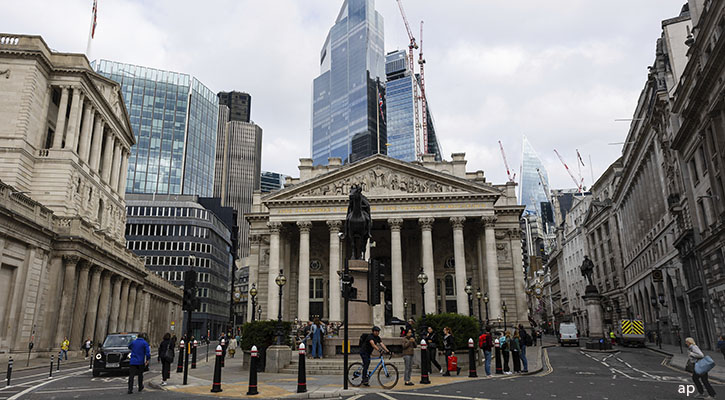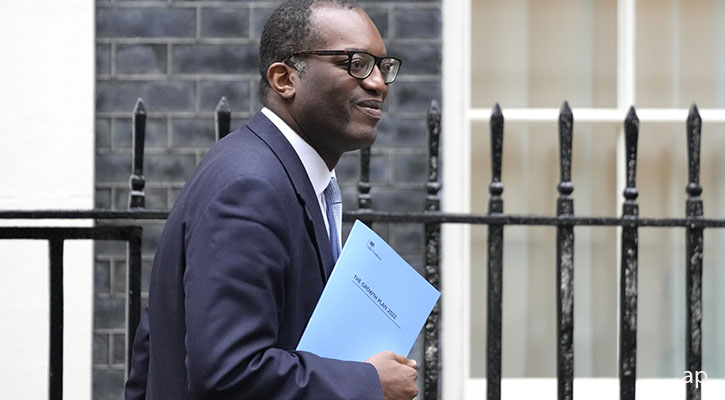The Bank of England’s intervention in the UK government bond market on Wednesday appears to have calmed nerves (for now). But why did the central bank intervene in the first place? It wasn’t to support the pound or keep the government’s shaky tax plans afloat, although these may be after effects.
Stresses in UK defined benefit/final salary pension funds are core to the issue, and these have put pressure on UK listed insurers, whose shares have fallen sharply this week.
Suddenly investors are getting to grips with something called Liability-Driven Investing (LDI). This is a complicated topic, but in essence: soaring bond yields have forced pension funds to sell gilts to meet liquidity requirements, threatening a vicious cycle that pushes yields ever higher (selling bonds pushes their price down and their yields up). Pension funds sometimes use financial instruments called derivatives– but this involves a degree of leverage or borrowing that requires funds to meet daily margin calls.
These are familiar from the world of stock and currency trading, where counterparties must ensure sufficient daily liquidity to keep going. Analysts at investment bank Jeffries say that rising yields should generally be positive for pension funds – because bonds are paying more out and liabilities are falling faster than assets – but the speed of the moves has caught many participants out. Derivatives are used to smooth cash flows, keep costs down and free up assets for higher-risk investments. Your pension will not just hold government bonds, which are generally low yielding and unexciting investments, but equities, corporate bonds etc to boost returns.
Covering Risk
They explain:
“In a scenario where rates are rising, a fund backed entirely by gilts would be under no pressure to change anything. However, where derivatives are used, the losses created by the derivatives prompt calls for additional margin or the fund runs the risk of its positions being stopped out. The pension fund needs to maintain the derivative position to cover the risk that the recent move in the curve reverses and the fund finds itself unhedged (creating a balance sheet mismatch)."
Jim Leaviss, CIO of public fixed income at M&G explains what’s happening neatly:
“Pension funds (PFs) have found themselves short of liquid collateral to pay to counterparties with which they have taken our interest rate or inflation swaps. As yields rose as a result of Friday’s announcement of unfunded tax cuts for the rich (and therefore expectations of more government bond issuance) pension funds with these LDI (Liability Driven Investment) swaps found themselves having to post collateral to cover mark to market losses.
“And therefore some had to liquidate other investments to do so – including gilts, sending yields up further and exacerbating the problem. This is purely a liquidity problem – PFs are solvent, and indeed for many of them higher yields actually reduce their funding deficits and would be good news in a less extreme scenario."
Some Breathing Space
Will the Bank of England’s action be enough? It’s buying £65 billion of long-dated gilts over 13 days, and also pausing the unwinding of quantitative easing, as I explained yesterday. The Bank was due to start selling off its government bonds last week but that has been delayed, because selling bonds into a weak market can only do one thing: push yields up further, exacerbating the sense of crisis. The UK 10-year government bond is up 158 basis points in a month to above 4% and 320 basis points in a year. These kinds of moves are very rare in otherwise staid UK bond market.
“The purchases will be unwound in a smooth and orderly fashion once risks to market functioning are judged to have subsided,” the Bank said yesterday. Currency traders pointed out on social media that this may be wishful thinking on the Bank’s part: what happens when the bond buying stops? Will the Bank be prepared to buy another tranche of bonds when the deadline expires.
Jefferies analysts think the move gives UK officials some breathing space: “This intervention has the potential to halt the spiral, at least temporarily, by giving funds the time to raise collateral. However, we emphasise that the scheme ends on 14 October and Quantitative Tightening (QT) begins on 31 October. As such, pension funds must act relatively rapidly to avoid a repeat next month.”
They expect announcements from companies affected in the coming weeks.
As this crisis effects final salary pension schemes, should those on defined contribution plans care? Well, the UK pension and insurance industry is central to UK financial services whatever type of scheme you have. Many corporate providers such as Legal & General, Axa, Aviva, Prudential Royal London etc offer a range of schemes worth trillions of pounds. The sector is known for its stability and financial prudence – after all it’s looking after millions of people’s retirement savings – so any shockwaves here are unlikely to be contained in an orderly manner. Investors in these companies are also facing a bruising period: Legal & General (LGEN) shares are off 15% over five days, Axa shares are 9% down, Aviva (AV) is off more than 11% and Prudential (PRU) shares are nearly 7% weaker in the same period.
The author or authors do not own shares in any securities mentioned in this article. Find out about Morningstar's editorial policies.

























